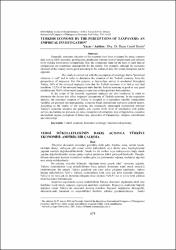| dc.contributor.author | Demir, İhsan Cemil | |
| dc.date.accessioned | 2017-07-06T11:29:39Z | |
| dc.date.available | 2017-07-06T11:29:39Z | |
| dc.date.issued | 2016-12 | |
| dc.identifier.uri | https://hdl.handle.net/20.500.11776/1818 | |
| dc.description | International Congress of Management Economy And Policy, 26-27 Kasım 2016, İstanbul | en_US |
| dc.description.abstract | Ülkelerin ekonomik durumları genellikle milli gelir, büyüme oranı, üretim hacmi, istihdam düzeyi, enflasyon gibi somut veriler kullanılarak veya uluslar arası karşılaştırmalar yapmak suretiyle değerlendirilmektedir. Ancak, bu tür verilere veya mukayeselere bağlı olarak yapılan değerlendirmeler zaman zaman toplum tarafından kabul görmeyebilmektedir. Örneğin, ülkenin ekonomik durumu istatistiksel verilere göre iyi görünmesine rağmen, toplumsal algı tam tersi yönde olabilmektedir. Bu çalışma, sosyoloji biliminin “algılanan neyse gerçek odur” varsayımı ışığında, Türkiye ekonomisinin vergi mükelleflerinin bakış açısıyla durumunu tespit etmek amacıyla yürütülmüştür. Bu amaçla Türkiye genelinde yüz yüze anket çalışması yapılmıştır. Ankete katılan mükelleflerin %36’sı Türkiye ekonomisinin kötü veya çok kötü durumda olduğunu, %33,2’si iyi veya çok iyi durumda olduğunu ifade ederken, %30,8’i ise ne iyi-ne kötü şeklinde ifade beyanında bulunmuştur. Araştırma kapsamında ayrıca, mükelleflerin Türkiye ekonomisi algılarında etkili olan faktörleri tespit etmek amacıyla regresyon analizleri yapılmıştır. Regresyon analizinde bağımlı değişken olarak Türkiye’nin ekonomik durumu alınırken; bağımsız değişkenler demografik, ekonomik-mali, kurumsal ve sosyo-kültürel faktörler şeklinde gruplandırılmıştır. Analiz sonuçlarına göre Türkiye’nin ekonomik durumu bakımından istatistiksel olarak anlamlı ilişki tespit edilen değişkenler cinsiyet, meslek türü, gelir düzeyi, kamu hizmetlerinden memnuniyet düzeyi, vergi yükü, vergi tazyiki, vergi oranları, yolsuzluk algısı, yasama, yürütme ve yargı organlarına güven düzeyi, demokrasi algısı, şeffaflık algısı, dini inançlara bağlılık düzeyi ve vatandaşlık bağıdır. | en_US |
| dc.description.abstract | Generally, economic situation of the countries have been evaluated by using concrete data such as GDP, economic growing rate, production volume, level of employment and inflation or by making international comparisons. But, the evaluations made on the basis of such data or comparisons are sometimes unacceptable for the society. For example, although the economic situation of the country seems good according to the statistical data, the social perception can be opposite. This study is carried out with the assumption of sociology that is "perceived whatever is real" and in order to determine the situation of the Turkish economy from the perspectives of taxpayers. For this purpose, a face-to-face survey is conducted throughout Turkey. 36% of the surveyed taxpayers state that the Turkish economy is in bad or very bad condition. 33,2% of the surveyed taxpayers state that the Turkish economy is good or very good condition and 30,8% of surveyed taxpayers state that neither good nor bad condition. In the scope of the research, regression analyzes are also conducted in order to determine the factors that affect taxpayers' perceptions of Turkish economy. In the regression analysis, the economic situation of Turkey is accepted as a dependent variable. Independent variables are grouped into demographic, economic-fiscal, institutional and socio-cultural factors. According to the results of the analysis, the statistically meaningful relationship between Turkey's economic situation are gender, job, income level, level of satisfaction with public service, tax burden, tax pressure, tax rates, perception of corruption, trust of legislative, executive and judicial organs, perception of democracy, perception of transparency, religious commitment and citizenship. | en_US |
| dc.language.iso | tur | en_US |
| dc.publisher | Namık Kemal Üniversitesi,İktisadi ve İdari Bilimler Fakültesi | en_US |
| dc.rights | info:eu-repo/semantics/openAccess | en_US |
| dc.subject | Türkiye ekonomisi | en_US |
| dc.subject | ekonomi sosyolojisi | en_US |
| dc.subject | vergileme ve ekonomi | en_US |
| dc.subject | Turkish economy | en_US |
| dc.subject | Economic sociology | en_US |
| dc.subject | Taxation and economy | en_US |
| dc.title | VERGİ MÜKELLEFLERİNİN BAKIŞ AÇISIYLA TÜRKİYE EKONOMİSİ: AMPİRİK BİR ÇALIŞMA | en_US |
| dc.title.alternative | TURKISH ECONOMY BY THE PERCEPTIONS OF TAXPAYERS: AN EMPRICAL INVESTIGATION | en_US |
| dc.type | article | en_US |
| dc.relation.ispartof | Balkan Sosyal Bilimler Dergisi | en_US |
| dc.department | Tekirdağ Namık Kemal Üniversitesi Dergileri | en_US |
| dc.authorid | 106755 | en_US |
| dc.identifier.startpage | 475 | en_US |
| dc.identifier.endpage | 491 | en_US |
| dc.relation.publicationcategory | Makale - Ulusal Hakemli Dergi - Kurum Öğretim Elemanı | en_US |



















